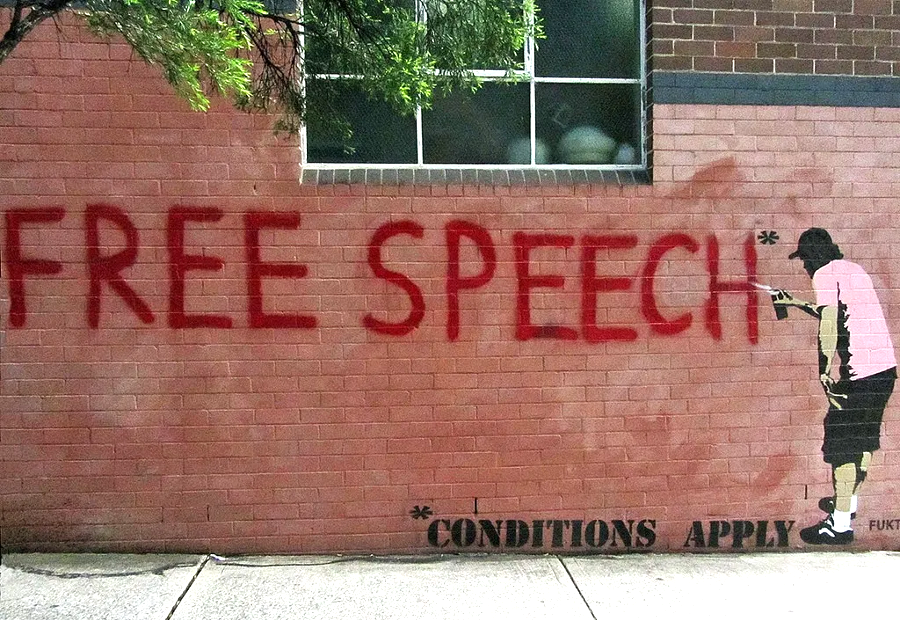By now, I’m sure you’ve heard of “cancel culture,” the social phenomenon where aggressive defenders of the oppressed will not only criticize you should you act, write, or speak in a manner that doesn’t conform to their demands, but will actively seek to punish you, socially and economically.
The phrase likely emerged from college campuses, where guest speakers who didn’t preach the proper narrative were deemed too dangerous to be permitted to deliver the addresses to those who invited them. Activists would petition administrations to disinvite such speakers, and in instances where they weren’t successful, they’d disrupt the speeches by yelling, chanting, and or marching around, in order to deny those who actually wanted to hear the speaker, whether in agreement or with an aim of constructive discourse and rebuttal. Sometimes, such ‘cancelers’ would even physically aggress an invited guest. The term “deplatforming” emerged from that behavior, and, as it was not only left unchecked by the solons of academia, it was actually encouraged and rewarded (by them, by the press, and by the balance of their tribe). That behavior, inevitably, grew beyond the hallowed and insulated halls of higher education into the culture at large.
Since “deplatforming” implied one was to be on a platform to begin with, it was limited in utility. Thus “canceling” supplanted it, and now it’s a broad cultural phenomenon, where even minor transgressions or bits of decades-old history are costing people jobs, hindering their career advancement, or imposing severe social pressure on average citizens and not just public figures.
Defenders of cancel culture, when they are not insisting that it doesn’t actually exist, argue that a person has the right to say things, but not the right to be immune to response or backlash. They are right… up to a point.
There are exceptions to the doctrine of free speech and the protections afforded by the First Amendment. You can’t slander or libel someone with immunity. You can’t incite to violence, whether it be person-to-person “fighting words” or rhetoric that drives others to violence, with immunity. There are also restrictions involving intellectual property (you can’t claim as your own someone else’s copyrighted words, or use them for personal gain without their permission), child pornography (a child, by definition, cannot consent), you can’t make credible threats against others, and so on. And, most germanely, you cannot intimidate someone.
All these exceptions are adjudicated by our court system, either civilly or criminally.
There is also the matter of another person’s right to act, write, or speak, and your right ends where it infringes on his. Within this criterion we find the right to protest (peacefully, and with respect for property rights), to boycott (again, peacefully), and to criticize publicly (within the constraints of libel law). So, yes, the cancelers are correct that words can have consequences.
Where they go wrong, and terribly so, is in the specific “consequences” they choose to foist upon others.
One of the great attractants to libertarianism, for me, is its intellectual consistency. While not perfect, it’s miles ahead of that offered by either liberalism or conservatism, astronomical units ahead of either of the major parties, and light-years ahead of leftism. One such intellectual consistency emerges from the NAP, the “non-aggression principle,” that asserts that the initiation of force is inherently wrong. In addition to serving as a guideline for individual behavior, a great many public policy questions can be answered by its application.
Cancel culture violates the NAP, on both an individual and a public level. Costing someone a job for hitting “like” on the wrong meme is an economic aggression, no matter that most employment is at-will and you (probably) aren’t violating any laws by boycotting that person’s employer until he complies (the legality of something doesn’t validate it morally). Moreso, the mere threat of such harm has a dampening impact on speech. If you fear economic reprisal (or social reprisal, for that matter), you’re going to modify your behavior, even if the things you’d normally say or write are wholly uncontroversial within the context of your employment.
So… No, dear canceler, your behavior is not just holding people accountable for their speech. It’s an aggression that’s intended to silence others, not rebut or refute their opinions and statements. It’s an assertion that some people’s rights are subordinate to others’, which flies directly in the face of the social justice and harmony you purportedly champion when you claim to confront peddlers of hate and bigotry. Your protestations are nothing more than a cover for bad behavior, for transgressing against others’ rights, and for being a bully.
You claim to hate bullies, right? So, stop being one. Show some respect for your neighbors and the society in which you live. You don’t condone their opinions by merely letting them voice them. If you wish, challenge those opinions. Try to convince them they’re wrong, and that they should see the world as you do. But, if they don’t, or if they only come over part way, don’t seek to ruin them, even if you know they’re wrong. And, please, stop pretending cancel culture doesn’t exist. You’re simply angry you’ve been called out for your wildly antisocial behavior.


Active Comment Threads
Most Commented Posts
Universal Background Checks – A Back Door to Universal Registration
COVID Mask Follies
When Everything Is Illegal…
An Anti-Vax Inflection Point?
“Not In My Name”
The Great Social Media Crackup
War Comes Through The Overton Window
The First Rule of Italian Driving
Most Active Commenters